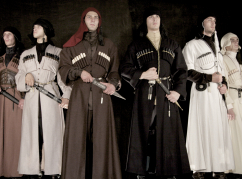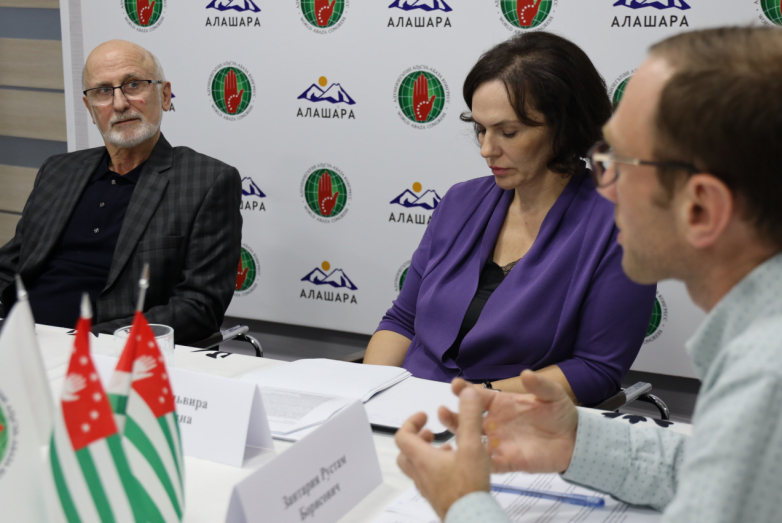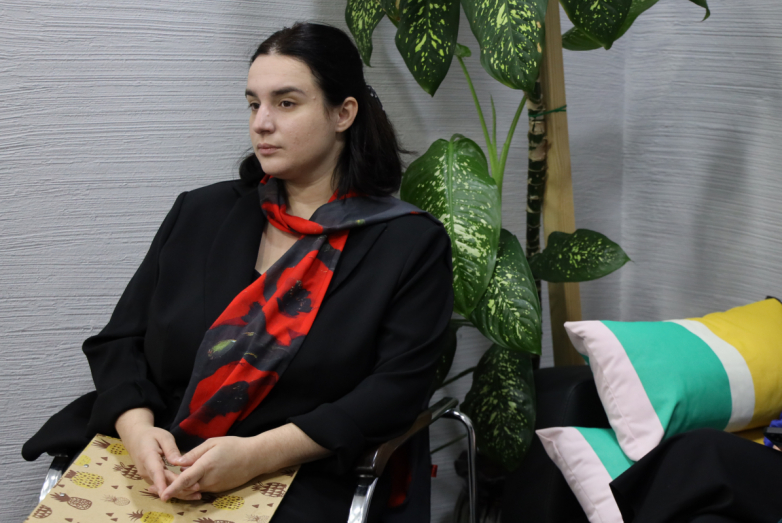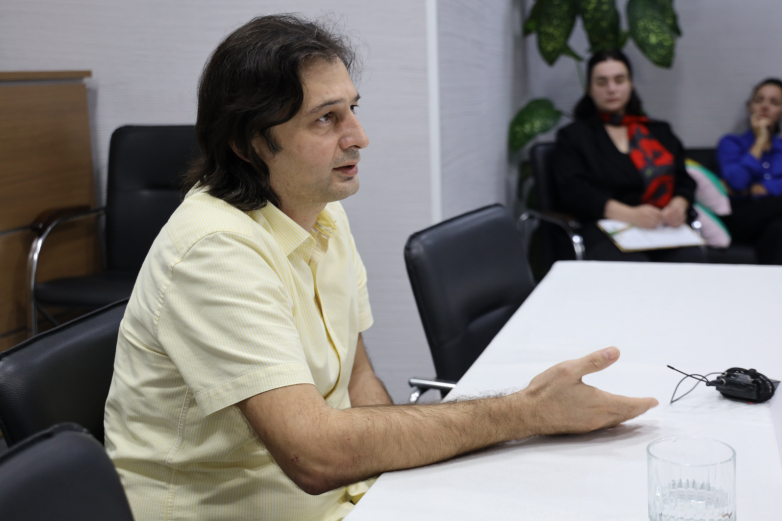Experts and members of the Discussion Club of the World Abaza Congress discussed the topic of preserving the traditional art of the Abkhazians and Abaza at another meeting in the WAC press center.
Invited experts and permanent members of the Discussion Club of the World Abaza Congress discussed the preservation and development of traditional and contemporary art of Abkhazians at the regular meeting of the club in the press center of the WAC on October 13.
The invited experts of the meeting were Nugzar Logua, Adviser to the President of Abkhazia on Science and Culture, Elvira Arsalia, director of the Central Exhibition Hall of the Union of Artists of the Republic of Abkhazia, and Mikhail Alkhazov, head of the Children's Art School No. 1 named after Konstantin Kovach.
The experts discussed a wide range of issues directly related to globalization and its impact on traditional art, as well as ways to preserve the traditional Abkhazian and Abaza culture. All experts agreed that the main component of the traditional art of Abkhazians and Abaza is the moral and ethical code of "apsuara" and that the traditional forms of Abkhazian art should remain unshakable, but at the same time, it is necessary to develop contemporary art.
Nugzar Logua, Advisor to the President of Abkhazia on Science and Culture, shared his vision of the development of Abkhazian culture in the era of globalization.
"The world is constantly transforming in social, economic, philosophical, and also in many other ways. Apsuara in its form is the philosophy of life of the Abkhazians. There are traditions and forms that must be followed in the Abkhazian culture. However, today society dictates different forms. Transformations are taking place. We cannot live apart from the global space and not let changes into our culture. In this sense, we surely must be socially organized at the state level. Classical forms should be preserved as basic values in education, art, and music," Logua shared.
The topic of preserving the Abkhazian non-material culture and its further fixation is actively discussed in society and is of great importance, says Elvira Arsalia, director of the Central Exhibition Hall of the Union of Artists of the Republic of Abkhazia.
"Most often we have questions about such cultural forms as music, costumes and dance moves. Today it is very important to separate authentic forms from stylization and further development. There has been a lot of discussion on this topic lately. Of course, this is a complicated process, but one day we would like to have a register of our intangible heritage. That is, these are the same dances, costumes, musical instruments, standards of an authentic work. All other forms, of course, must be present in art, but within the framework of the reproduction of traditional culture," said Elvira Arsalia.
Nugzar Logua believes that talent alone is not enough for representatives of creative professions to further success and recognition, their knowledge and skills must be supported by high-quality academic education.
"Every year, we graduate 20-25 people from the Faculty of Arts of the Abkhazian State University [Department of Arts of ASU]. It should be noted that we have very talented and promising young people. However, we are still at the stage of developing a unified education system. Becoming a true professional in art, music and dance requires many years of academic education. At the initial stage, this is an art school and then secondary specialized education, higher education is considered to be the completion of training," said Nugzar Logua.
Director of the Children's Art School No. 1 named after Konstantin Kovach Mikhail Alkhazov noted that unfavorable trends in the development of Abkhazian art might be associated with social stereotypes.
"Unfortunately, in our society, art is considered only as part of the overall development of a child. Few parents in modern Abkhazia think about giving their child a professional creative education, because, as is commonly believed, it does not bring a stable financial income. If today we do not make enough efforts to educate professionals in narrow creative fields, tomorrow no one will be able to educate our children," said Mikhail Alkhazov.
According to experts, one of the main factors in the preservation of the Abkhaz-Abaza cultural heritage is the continuity of generations. The experts agreed that in order to further preserve and develop the art of Abkhazians and Abaza, it must be actively promoted.
"Many forms of art should be inscribed in the socio-economic model of the country. Otherwise, they simply will not be viable. Recently, we have seen the popularity of tourist routes through historical sites, architectural walks and many more. We should use this opportunity to attract financial investments," Mikhail Alkhazov emphasized.
He also noted that the development of business sites in the cultural sphere within an acceptable framework would contribute to the popularization of art.
All participants of the round table expressed a common opinion that the preservation of national art is possible only within the framework of a national ideology common to the whole country.
"In the modern cultural space, the tendencies of erasing the boundaries between peoples are increasing more and more. In the era of globalization, it becomes especially important to preserve your cultural forms. There are no small nations, there are small opportunities," said Elvira Arsalia.
At the end of the meeting, the experts of the Discussion Club concluded that in order to preserve and further develop the traditional and modern art of Abkhazians and Abaza, it is necessary to use all available resources. Such resources can be various kinds of creative platforms that unite people of art. Tourism business projects will also help popularize art by expanding the geography of knowledge about history and art. Attracting investors who are interested in creativity will open up new opportunities for many talented people. Actions aimed at the development and popularization of art will make a huge contribution to the culture of the Abkhazians and Abaza. The experts unanimously concluded that the attitude of future generations to the traditional art of Abkhazians and Abaza will depend on the agenda that is being created today.
The WAC Discussion Club was opened in November 2019. Its activities are carried out in several areas: the preservation of the language, the moral, ethical and cultural heritage of the Abaza people, the popularization of national science, environmental protection and others. Club members are mostly young people. In 2019-2020, the Sukhum club worked out an environmental direction. 23 people attended this section. The Parents' Club also successfully operates in the Discussion Club of Abkhazia.




to login or register.